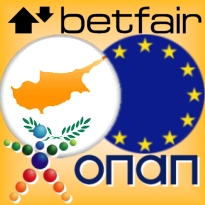 Betting exchange Betfair has filed a formal complaint with the European Commission (EC) over new legislation in Cyprus that bans most online gambling operators from offering most of their services to Cypriots. The legislation, which was passed in July after occasionally rancorous debate, banned all forms of online gambling except sports betting and the passive numbers games offered by Greek gaming giant OPAP. The law specifically banned betting exchanges on the grounds that they were to match-fixers what dogshit is to house flies, a suggestion that prompted howls of outrage from Betfair, which derives 4% of its annual revenues from Cyprus.
Betting exchange Betfair has filed a formal complaint with the European Commission (EC) over new legislation in Cyprus that bans most online gambling operators from offering most of their services to Cypriots. The legislation, which was passed in July after occasionally rancorous debate, banned all forms of online gambling except sports betting and the passive numbers games offered by Greek gaming giant OPAP. The law specifically banned betting exchanges on the grounds that they were to match-fixers what dogshit is to house flies, a suggestion that prompted howls of outrage from Betfair, which derives 4% of its annual revenues from Cyprus.
Commenting on its letter to the EC, Betfair’s chief legal eagle Martin Cruddace said Cyprus’ new legislation “goes against European free-market principles” and was “clearly incompatible with EU law.” Cruddace defended Betfair’s reputation as a “transparent and responsible operator, with a track record of working co-operatively alongside government in any jurisdiction in which it operates.” Betfair is also convinced that the free ride OPAP received from Cypriot legislators merely served to underscore the law’s inconsistencies.
However, Cypriot legislators are themselves only just learning the full extent of the preferential treatment OPAP has received. Last week, the Cypriot parliament’s House Legal Affairs Committee raised eyebrows with its revelation that authorities had never checked on OPAP’s activities in Cyprus since the company began operating on the island in 1969. As reported by the Cyprus Mail, MPs were taken aback to learn that the bilateral agreement Cyprus signed with Greece in 1969 (and renewed in 2003) effectively exempted the state-controlled OPAP from oversight. Committee chairman Ionas Nicolaou somewhat sheepishly admitted that the knowledge that “no one in authority was aware of how the bets of OPAP in Cyprus are carried out” had opened legislators’ eyes to “the law’s shortfalls.”
According to a spokesman for MOKAS, the nation’s money laundering watchdog, “no specific check has ever been made on OPAP bets.” Nicolaou also revealed that the police told him “the force cannot investigate anything relating to OPAP bets, as there are no crimes or penalizations included in the bilateral agreement.” OPAP Cyprus’ general director Michalis Himonas said OPAP was willing to supply whatever info the authorities wanted to see, claiming there was “full transparency between OPAP and the state.” Perhaps, but the knowledge that OPAP is preparing to undergo privatization has convinced some Cypriot legislators that it’s time to rethink OPAP’s favored status.





